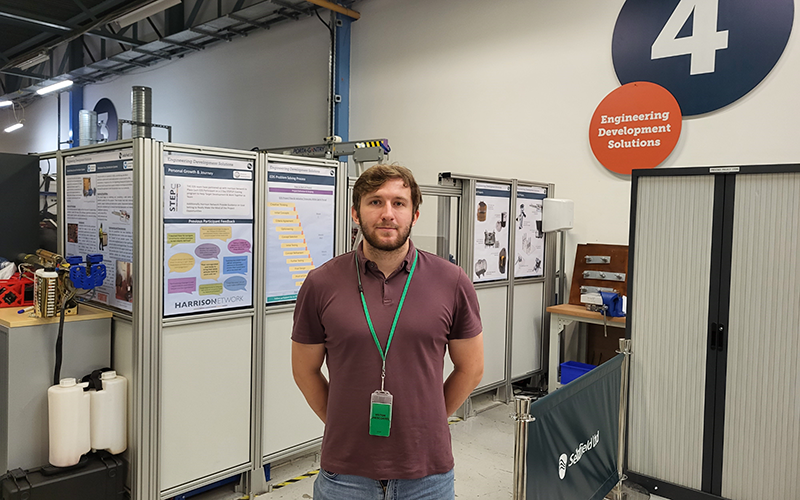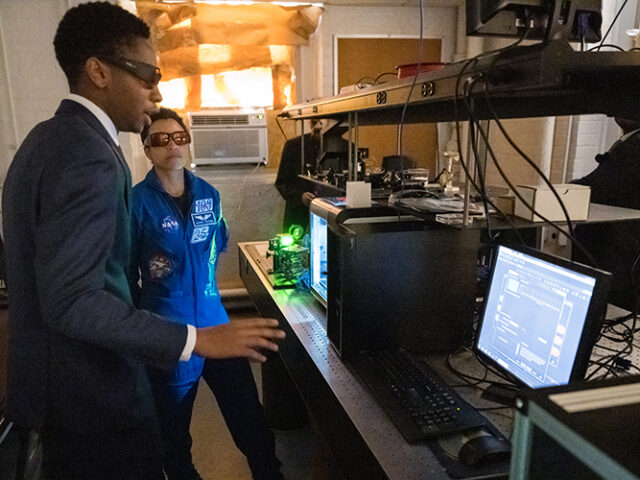An opportunity to learn from different industries is bringing industry, SMEs and young graduates together in a spirit of collaboration which will be embraced by a solutions hub.
Connor Brown, 22, who is taking part in a two-year graduate scheme with the Ministry of Defence’s Submarine Delivery Agency, has been working on a six-month placement at Sellafield’s Engineering Centre of Excellence.
Connor, who gained a degree in electronic and electrical engineering at the University of Liverpool, arrived at Sellafield to learn more about the nuclear industry after spending six months at BAE Systems in Barrow working on the nuclear submarine programme.
At BAE Systems, Connor learned about power generation, conversion, and distribution of submarine electrical power systems by working with the Dreadnought Alliance.
At Sellafield’s Engineering Centre of Excellence in Cleator Moor, Connor has worked on two six-week rapid prototyping projects alongside members of the Sellafield team and a range of specialist SMEs.
One project, where Connor was team leader, involved supply chain collaboration partners the Submarine Delivery Agency, React Engineering, and Durham University, looking at ways of improving visibility in Sellafield’s AGR Facility where the main goal was to reduce downtime and increase throughput.
With all UK AGR reactors scheduled to move into defueling by 2030 it’s vital that Sellafield’s AGR facility is able to operate at maximum capacity to meet increased demand.
The group working on the project visited PAR Systems and Atkins to see what technology was available. Rexel and Venture Lighting were also consulted to develop a solution which the team presented to the client.
The other project Connor worked on involved supply chain partners the Submarine Delivery Agency, Forth and PAR Systems, working together to improve the method of improving/redesigning the MER Jaw Collets within Sellafield’s AGR facility.
After prototyping and testing solutions the group was able to recommend a solution to the client which also delivered cost savings.
An MoD colleague of Connor’s also worked on a separate six-week project where supply chain partners Forth, React Engineering, and Lakes College worked with the Submarine Delivery Agency, to develop a solution for a project for the Calder Heat Exchanger which may also have benefits for other areas of Sellafield site.
Connor said: “It’s been really interesting coming from the defence industry and working with SMEs on solutions for the nuclear industry. There’s so much we can all learn from each other.
“I am really proud of the way we all collaborated, pooled that knowledge and expertise, and came out with solutions which hopefully will be able to be deployed on Sellafield site.
“The Engineering Centre of Excellence is the ideal venue to carry out this work because it’s okay for something to fail here. Then you can learn from that and develop a solution that works. I have really enjoyed it.”
Craig Branney, Sellafield’s Head of Off-Site Developments, said: “When we first set up this centre this was exactly the vision. That different industries – in this case defence and nuclear – would come together with some of the amazing SMEs we have in the region and work together on solutions which will not only benefit Sellafield but other sites and other industries too. It’s brilliant to see this happening.”
This collaboration is also at the heart of iSH, (the Industrial Solutions Hub), which will help bring 700 jobs to the North-West region.
Based at Leconfield, but with a mission to bring positive change to people’s lives, the economy, and the environment across West Cumbria and beyond, iSH will create a solutions hub where businesses in the region will be able to collaborate and work with other specialist companies from around the UK and the rest of the world on delivering solutions to industry challenges. These solutions will then be able to be exported around the globe, helping organisations expand and create further job opportunities.
John Maddison, iSH managing director, said: “The collaboration on show here between the MoD, Sellafield, SMEs, graduates and academia and the results that delivers is why we are so excited about what can be achieved here through iSH. It’s a once-in-a-lifetime opportunity which if we all work together in this way we can grasp and deliver positive change in a programme of regional, national, and international significance.”
Having just concluded his time with Sellafield, Connor hopes his next six-month placement will be spent with the UK Embassy in Washington DC learning about nuclear deterrent policy.




